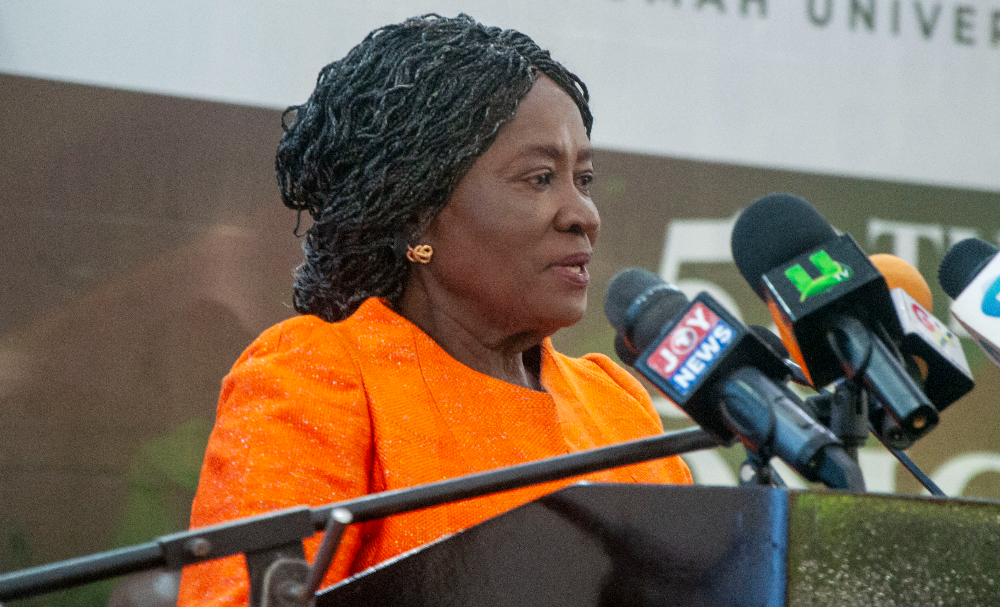At the 58th Congregation of the Kwame Nkrumah University of Science and Technology (KNUST), Kumasi, Ghana's Vice President Professor Jane Naana Opoku-Agyemang emphasized the indispensable role of academic freedom in the effective functioning of Ghana's higher education institutions.
Her remarks resonated with a commitment to empowering university governance and fostering an environment free from undue political interference.
Raging debates
Since 1993, Ghana has made continuous efforts to institutionalize academic freedom and university autonomy through various legislative instruments, including the Universities Act. However, despite these advancements, debates surrounding academic freedom persist.
These discussions often revolve around critical issues, notably the extent of government influence in the appointment of university councils and vice-chancellors, which remains a frequent point of contention.
Additionally, the reliance of public universities on government funding can subtly, yet significantly, influence academic decisions and autonomy.
Furthermore, periodic attempts to introduce new legislation, such as various iterations of the Public Universities Bill, have consistently drawn criticism for potentially undermining the established autonomy and academic freedom of public universities by increasing governmental control.
Advocacy for non-interference and accountability
In her address, Professor Opoku-Agyemang, a former Vice-Chancellor, highlighted that academic freedom is fundamental to promoting efficient university operations and ensuring the smooth functioning of their governing councils and management.
She conveyed that His Excellency John Dramani Mahama is "firmly committed to empowering university councils and management to perform their statutory duties without undue political interference," underscoring a vision where universities are given the autonomy necessary to fulfill their mandates, guided by their established statutes and acts.
Crucially, this policy of governance non-interference does not imply a lowering of standards. Professor Opoku-Agyemang emphasized that universities would continue to be held to high standards.
The Ministry of Education, acting through the Ghana Tertiary Education Commission, would maintain its partnership with institutions.
This collaboration aims to ensure continued compliance with regulations, policies, and standards, and that governing councils operate strictly within the provisions of the statutes and acts that govern university operations.
She clarified that the Ministry's role would be to "intervene for compliance, not interfere unduly with legitimate processes and operations of universities." This nuanced position seeks to strike a balance between safeguarding institutional autonomy and upholding accountability.
The Ghana National Research Fund
Professor Jane Naana Opoku-Agyemang added to the discourse on The Ghana National Research Fund (GNRF), which represents a significant step towards providing sustainable financial resources for research, innovation, and technological generation across all disciplines.
Established by the Ghana National Research Fund Act (Act 1056) in December 2020, the GNRF aims to transition Ghana from a historical reliance on sporadic and largely externally driven research funding.
This initiative seeks to provide a more stable and substantial funding base, empowering Ghanaian researchers to address national challenges, foster innovation, and contribute significantly to the country's development goals.
A pivotal moment for the GNRF occurred recently with the official inauguration of its 13-member governing board on June 4, 2025. Led by Professor Eric Yirenkyi Danquah as the inaugural Chair, the board's establishment signals the Fund's readiness for full operationalization.
Initial financial commitments have been made, with GH¢50 million allocated for 2025 and a minimum of GH¢100 million secured for 2026 through the Ghana Education Trust Fund (GETFund). Plans are also underway to allocate a percentage of national revenue, potentially increasing from 0.5% to 1%, to further support the Fund.
Maximizing KNUST's research impact
For institutions like KNUST, the establishment of the Ghana National Research Fund presents a significant opportunity not just for increased funding, but for strategically enhancing its research output and global standing. Leveraging robust data on its own research performance will be crucial.
By meticulously tracking publications, citations, collaborations, patents, and real-world impact, KNUST can help identify its areas of research strength, pinpoint emerging fields, and make data-driven decisions on where to invest resources to achieve greater impact.
| Story: Emmanuel Kwasi Debrah (URO) | Photos: Jonathan Gyepi-Attee (URO) | |

















